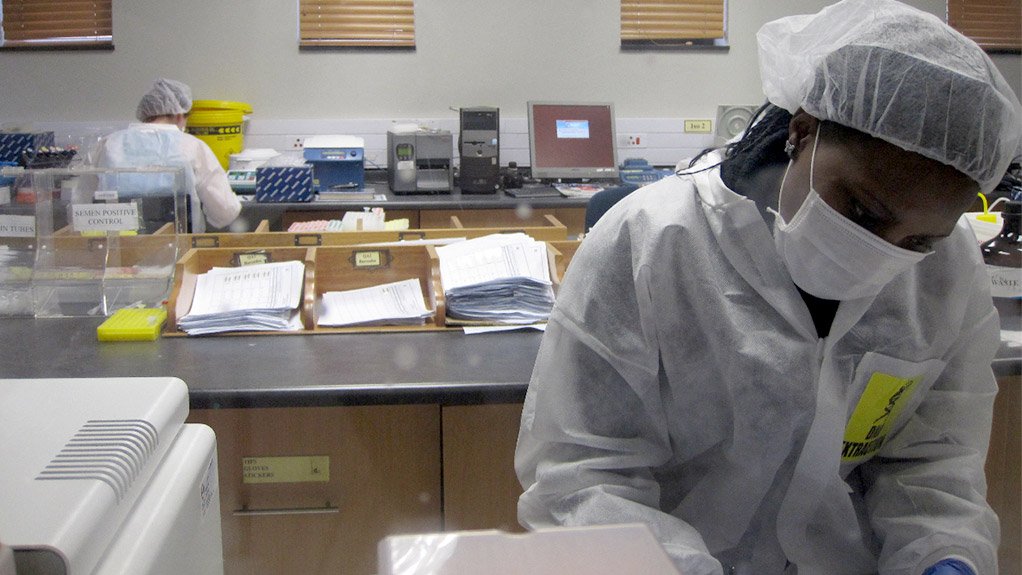DNA Act passed, mandatory DNA collection for serious crimes on the cards
The path has been cleared for South Africa to have its own extensive DNA database for use by the South African Police Service (SAPS) in the investigation of crimes.
The DNA Act has been signed by President Jacob Zuma and published in the Government Gazette, bringing to fruition a decade of work for Vanessa Lynch and her colleagues from The DNA Project.
An attorney by training, Lynch formed nongovernmental organisation The DNA Project to pursue the goal of establishing a DNA database within SAPS.
Matching a human being’s distinct genetic blueprint, their DNA, found on a crime scene, to an extensive database of offenders may seem like a simple exercise. Done in almost every crime series on television, and at law enforcement agencies in numerous countries around the world, it is hard to believe this has not been a reality in South Africa.
However, Criminal Law (Forensic Procedures) Amendment Act, No 37 of 2013, now, finally, changes this.
There are “busy times ahead, but so exciting”, says Lynch.
The SAPS does currently have a DNA database, but it is populated by a mere, roughly, 180 000 profiles.
Prior to the new Act, there was no legislation regulating DNA collection by the SAPS, which meant it had no mandate to take DNA samples from those arrested for serious crimes, or from convicted offenders.
However, the new Act enables the establishment, regulation, administration and maintenance of what will be called the National Forensic DNA Database of South Africa.
It will make it mandatory for DNA samples to be collected by specially trained police officers from those arrested and convicted of serious offences.
If SAPS increases the number of profiles on its database, it will increase the chance of finding a match and linking a DNA profile found at a crime scene to a suspect, or, at the very least, deriving criminal intelligence therefrom.
Moreover, DNA profiles can also serve to exonerate convicted persons, as well as assist in the identification of missing persons and human remains.
SAPS last year estimated the cost of implementing the Act, over a three-year period, at R1.26-billion, of which the bulk will be operational costs, at around R900-million.
Implementing the Act will require the training of police officers, as well as the appointment of additional forensic analysts.
Comments
Press Office
Announcements
What's On
Subscribe to improve your user experience...
Option 1 (equivalent of R125 a month):
Receive a weekly copy of Creamer Media's Engineering News & Mining Weekly magazine
(print copy for those in South Africa and e-magazine for those outside of South Africa)
Receive daily email newsletters
Access to full search results
Access archive of magazine back copies
Access to Projects in Progress
Access to ONE Research Report of your choice in PDF format
Option 2 (equivalent of R375 a month):
All benefits from Option 1
PLUS
Access to Creamer Media's Research Channel Africa for ALL Research Reports, in PDF format, on various industrial and mining sectors
including Electricity; Water; Energy Transition; Hydrogen; Roads, Rail and Ports; Coal; Gold; Platinum; Battery Metals; etc.
Already a subscriber?
Forgotten your password?
Receive weekly copy of Creamer Media's Engineering News & Mining Weekly magazine (print copy for those in South Africa and e-magazine for those outside of South Africa)
➕
Recieve daily email newsletters
➕
Access to full search results
➕
Access archive of magazine back copies
➕
Access to Projects in Progress
➕
Access to ONE Research Report of your choice in PDF format
RESEARCH CHANNEL AFRICA
R4500 (equivalent of R375 a month)
SUBSCRIBEAll benefits from Option 1
➕
Access to Creamer Media's Research Channel Africa for ALL Research Reports on various industrial and mining sectors, in PDF format, including on:
Electricity
➕
Water
➕
Energy Transition
➕
Hydrogen
➕
Roads, Rail and Ports
➕
Coal
➕
Gold
➕
Platinum
➕
Battery Metals
➕
etc.
Receive all benefits from Option 1 or Option 2 delivered to numerous people at your company
➕
Multiple User names and Passwords for simultaneous log-ins
➕
Intranet integration access to all in your organisation



















